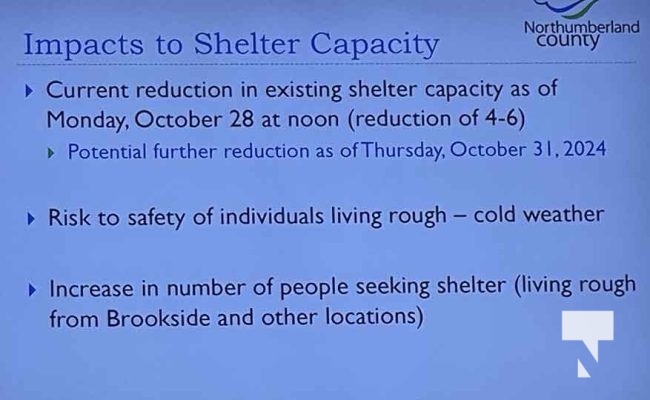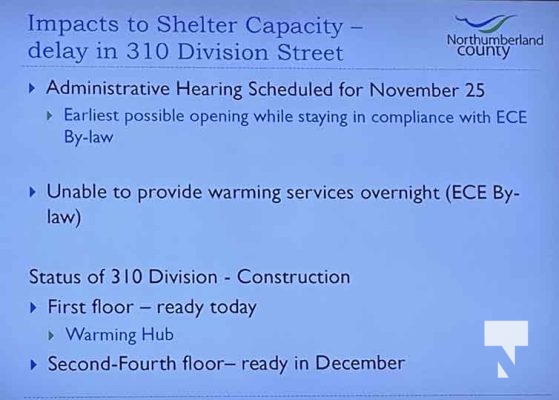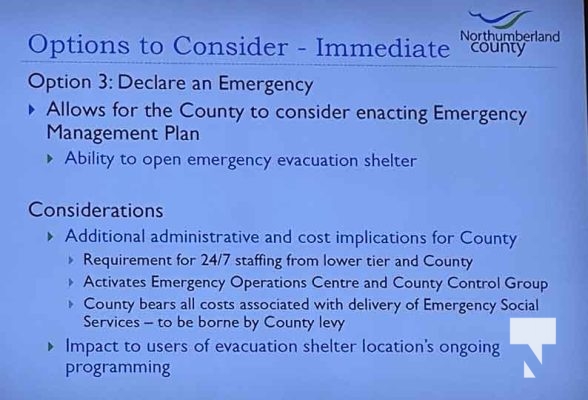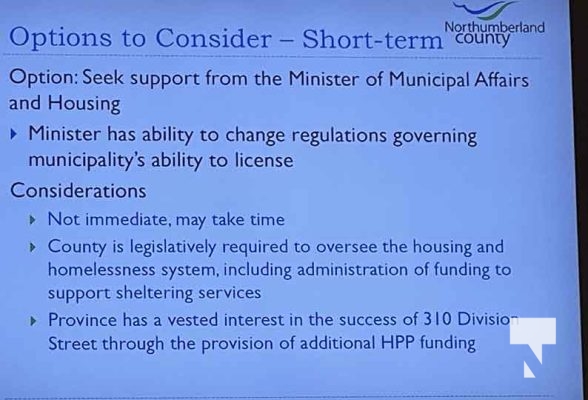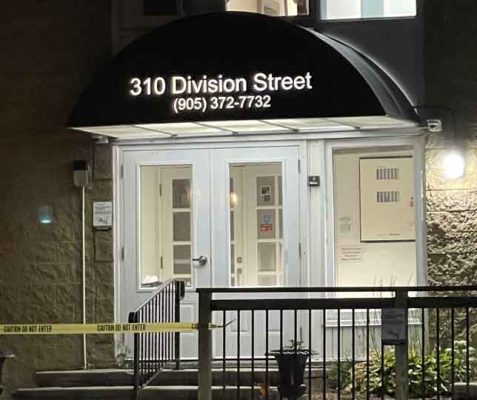By Cecilia Nasmith/Today’s Northumberland/Northumberland 89.7 FM
With the chance of losing most emergency shelter services it offers by Thursday, Northumberland County council voted Tuesday to try one more time to work with the Town of Cobourg “to look at ways to comply” with their Emergency Care Establishment bylaw. “requesting resolution within five business days.”
The meeting was called in advance of a Thursday noon deadline, when the county’s emergency shelter at Transition House will learn from the Cobourg Fire Department whether it will be able to continue operations and at what capacity, depending on their review of the fire plan for their current location at 10 Chapel St.
And an hour prior to the Tuesday meeting, the Town of Cobourg held its own 9 a.m. closed-session meeting.
Though the agenda listed speakers as Director of Health and Human Services Glenn Dees and Associate Director of Housing and Homelessness Rebecca Carman, Transition House board chair Meaghan Macdonald and Executive Director Ike Nwibe also spoke. Their address was over the objections of Cobourg Mayor Lucas Cleveland, as they had not been listed in the agenda.
“I’m concerned about a biased perspective if we are only going to hear from one side and not the other side,” Cleveland objected.
Macdonald explained that Transition House had applied for a license for operations under the town’s Emergency Care Establishments bylaw at their current location, which was approved July 17 – though there was mention of reducing their 22-bed capacity.
She said that “last Thursday” they had been ordered to reduce their capacity to 16. Now they have learned from the fire department that approval is contingent on reducing capacity to 10 by this Thursday at noon. They have asked for a meeting with the fire department on Thursday, but cannot get a commitment on whether the meeting can be before noon or not. If their fire plan is not approved, Carman noted, their capacity could be reduced to zero.
The reduction comes as winter is approaching and the new shelter at 310 Division St. continues to be unable to open. And, Nwibe pointed out, at a time when he has heard from nine people in the encampment at the former Brookside Youth Centre who would like to get into shelter as the closing date of the Brookside sale approaches.
Cleveland pointed out past overcrowding at Transition House, saying he had to agree that residents might have a hard time escaping safely in case of fire.
Macdonald replied that she did a walk-through with the fire prevention officer last summer when the occupancy was 22, and no such concerns were expressed.
“We are coming to let you know we might not be able to operate an emergency shelter service as of Thursday,” she said.
Nwibe added that the majority of homeless people he works with are long-time Cobourg residents, some of whom are former home owners.
Councillor Scott Jibb said no one wants to see anyone displaced from shelter, but no one wants to see anyone in an at-risk situation either.
A number of people lined up when offered the chance to address council, including Chloe Cragg who lives right beside 310 Division St.
“I believe this reduction in services is going to do more harm to Cobourg than good. The fact that the Mayor of Cobourg is opposed to all this in his different ways is just going to put more people on the street and do more harm,” she said.
Cragg urged that 310 Division be allowed to open and help the homeless “get back to how they want to be.
“Just let it happen. Let 310 open. Let people find that space where they can reclaim themselves as individuals and move forward.”
Jenni Frenke, who volunteers at the Brookside encampment, agreed.
“The survival behaviours the community is upset about seeing, is going to get worse. We’ll have more people on the streets, those kinds of behaviour get worse. So the entire communities safety is in jeopardy when you don’t allow the only shelter that we have to operate.”
“I don’t care what the bylaw is, I don’t care what the fire code is, just let the current Transition House operate and for God’s sake, can we please open 310.”
As a second winter at Brookside begins, she added, “I am handing out emergency blankets and sleeping bags to help people live through the night right now.”
Frenke stated that the Emergency Care Establishment bylaw is a human rights infringement stating there have been letters sent to the Ontario Human Rights Commission.
Former Transition House board member (and Brighton councillor) Jeff Wheeldon agreed that dignity is a concern, but argued that it ranks lower on the hierarchy of needs than the need for shelter.
Chance Brown spoke from the encampment, saying more than half the people he spoke to there are hoping for some kind of exception to the ECE bylaw that will allow 310 Division St. to open.
A hearing is scheduled Nov. 25 on opening the first floor, and upper floors could be ready by December.
Meanwhile, staff put forward three options.
To do nothing – would force staff to deal with a shelter capacity reduced by more than 40%. It would be in noncompliance with provincial funding expectations, as well as reducing services that provide a pathway out of homelessness and probably forcing layoffs at Transition House.
To purchase additional motel space – would cost $3,000 to $7,000 a month. It’s not a secure resource, as business owners have the right to change their minds or raise their prices.
To declare an emergency – activates emergency evacuation shelters and requires 24/7 staffing by upper tier and lower tier governments, with all costs borne by the county.
All options mean no warming room. As Chief Administrative Officer Jennifer Moore explained, warming rooms in previous years were possible because the county rented space for them. With ready-to-go space at 310 Division St., this extra expense was not undertaken.
There is also the option to approach the Ministry of Municipal Affairs and Housing, which potentially has the authority to change regulations governing municipalities’ ability to license shelter establishments. As well, with the money the provincial government has already invested in 310 Division St., it has a vested interest in its success.
Jibb could not support the motel option after hearing calculations that a closure at Transition House and the sale of the Brookside Property could mean 35 to 40 people needing shelter – at a cost, he estimated, of $120,000 a month.
“If we declared an emergency, there are shelter and reception centres, so we could activate a shelter where we could use Red Cross-type cots and have a service provide meals, as we would in a severe-weather event or something along those lines,” Chief Administrative Officer Jennifer Moore said.
The options are there if the meeting does not work out, Hankivsky said. But Moore could not be optimistic about a resolution, given the town’s refusal to bend on the key two exemptions they are requesting in order to be licensed under the ECE bylaw.
They can conceivably throw enough money at the extraordinary security and garbage requirements, Moore said. But the town is not deviating from the liability requirements – that the county bears all personal liability including staff and board members, and that the town bears no liability (as she has previously put it) even if they do something deliberately.
“We need a dance partner to dance,” she stated.
Looking at the immediate future, council passed Jibb’s motion to allocate another $40,000 to the budgeted amount for motel space.
Referring to the time frame, Jibb added, “I am willing to support this motion because it is only five days.
However, I see the necessity of having another emergency council meeting to go in a different action.”
Specifically, he said, that might be to bring forward a request to the Minister to have the bylaw set aside.
The facility at 310 Division Street can hold 143 occupants with 50 being on the first floor.


